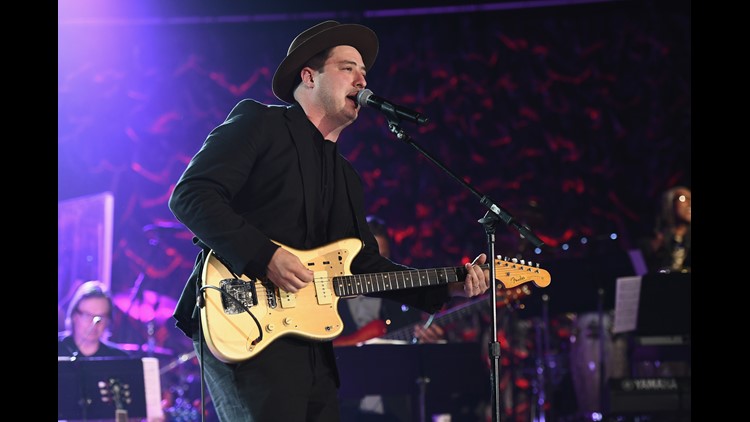Five songs. Two days. One new Mumford & Sons EP.
Johannesburg, released Friday, is the byproduct of the British rockers' whirlwind tour across South Africa early this year, where they squeezed in studio time with Senegalese singer Baaba Maal, Cape Town trio Beatenberg, and Swedish-Malawian duo The Very Best. Written and recorded in just two daylong sessions, the resulting mini album fuses the band's signature folk sound with African beats and instruments. 
Frontman Marcus Mumford chats with USA TODAY about critics, switching things up and what's next:
Q: After releasing album Wilder Mind last year, were you looking to jump right back in to writing and recording? You've been touring pretty steadily since.
A: We're always actively looking to, but we never really manage to carve out enough time on tour. So it was nice to get a couple days and not think about it too much. That was the key to this thing, really. We enjoyed the spontaneity, because we didn't know for sure that anything would come of it.
Q: Some fans and critics were disappointed with your last album's electric sound. Did those reactions influence your decision to branch out even more?
A: No, definitely didn't. We ignore all that noise. If you start making career decisions based off what the critics say, then it's the beginning of the end. I feel we're just revealing more of the nature of our band to people. We've always been curious when it comes to different musical styles — that's how we started, we didn't grow up playing acoustic instruments. Nothing we ever do is really strategic; it's never commercially minded. You don't put the word "(expletive)" in the middle of your first single and start playing the banjo if you're looking for commercial success.
![636017424066825770-1465928913Mumf-JbergEP-PackshotHIRES.jpg [image : 86026622]](http://www.gannett-cdn.com/-mm-/f98f2033a64b71c86e818afe49fa782a78bcad94/c=0-291-4000-3710/local/-/media/2016/06/17/USATODAY/USATODAY/636017424066825770-1465928913Mumf-JbergEP-PackshotHIRES.jpg)
Q: What's something you got to try for the first time recording this? Baaba says you picked up African drums pretty quickly.
A: Yeah, I played percussion growing up a lot. I was a drummer first, really, and had learned some Afrobeat stuff when I was at high school, but had never really played. Mamadou (Saar, of Beatenberg), who is Senegalese, his idea of rhythm is very different to mine. Everything is a lot more fluid. There's rough structures, but mostly it's just following the groove. It's like jazz, in that way.
Q: How do you feel you grew most as a band through this project?
A: We realized that if you have the right attitude, you can play music with almost anyone. I want to constantly be playing with different people, because the more people you play with, the more you learn. We're of a generation where we can access all types of music easier than anyone ever has, so these hybrid forms — just taking things that you might not normally hear together — is exciting to me.
It's why we put house beats to bluegrass music: We really enjoy mixing stuff together. There's one song on the EP that has four different languages in it. It's fun, you can appreciate good songwriting even if you don't understand. Sigur Rós is one of my favorite bands, and I have no clue what they're singing about.
Q: Have you started working on the next album yet?
A: Yeah, we've started writing and talking about it, but we're in the middle of tour right now, so it's hard to think about much else. We're going to take a break in July and do some writing and recording, and see where we stand at the end of the summer. We've got a couple bits of touring left in the autumn, then we'll see.
![Mumford & Sons, Baaba Maal - There Will Be Time (Live in South Africa) [oembed : 86026634] [oembed : 86026634] [oembed : 86026634] [oembed : 86026634] [oembed : 86026634] [oembed : 86026634] [oembed : 86026634] [oembed : 86026634] [oembed : 86026634] [oembed : 86026634]](/Portals/_default/Skins/PrestoLegacy/CommonCss/images/smartembed.png)



![539083454 E ACE ENT USA NY [image : 86026618]](http://www.gannett-cdn.com/-mm-/3af855338544465fe83db8fc2035df1f44be1921/c=583-0-4714-3531/local/-/media/2016/06/17/USATODAY/USATODAY/636017424088665910-539083454-82497934.JPG)
